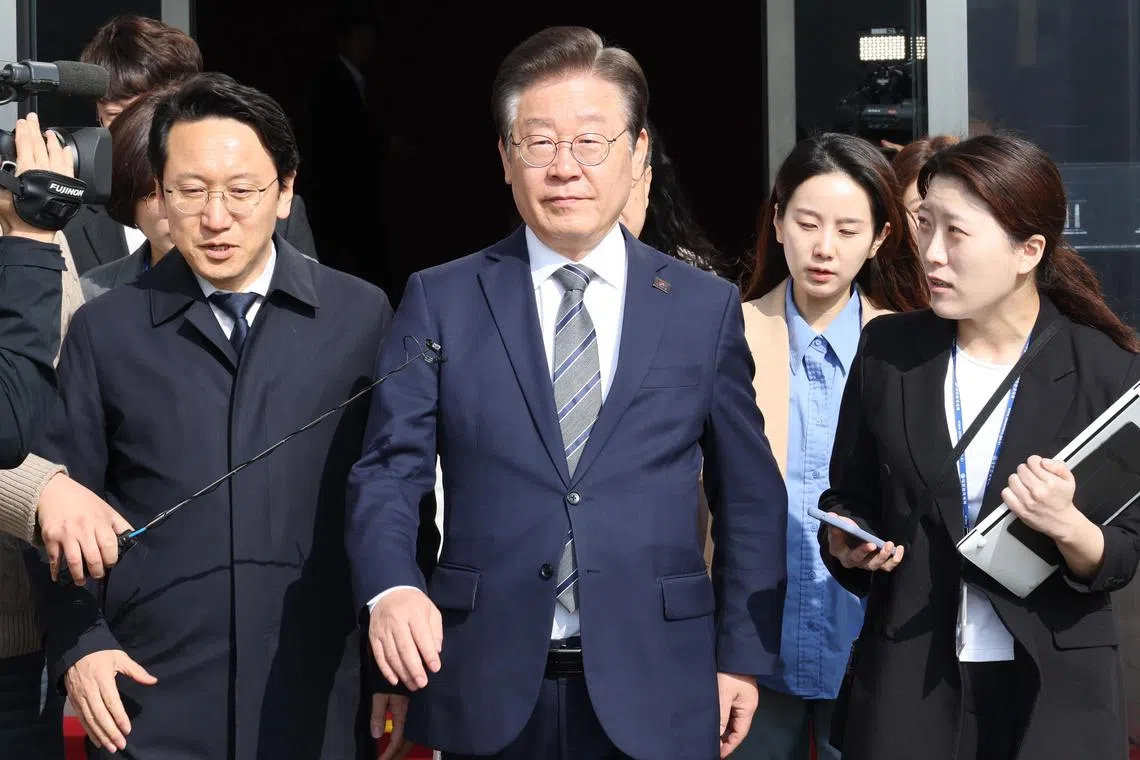South Korean opposition leader’s legal woes cause rifts in bloc before elections
Sign up now: Get insights on Asia's fast-moving developments

Lee Jae-myung has repeatedly denied the allegations, saying he is being targeted by the President in “political repression”.
PHOTO: EPA-EFE
SEOUL - South Korea’s prosecution of the opposition leader on criminal charges has caused rifts in the progressive bloc, with lawmakers worried it could hurt their chances of keeping control of Parliament in next year’s elections.
Democratic Party leader Lee Jae-myung appeared in court on Friday to stand trial on a charge of violating the election law
Lee did not speak to reporters, but he has repeatedly denied the allegations, saying he is being targeted by the President in “political repression”.
Lee, who has also been indicted on charges including breach of duty and bribery, is likely to have more court appearances that keep his case in the headlines for months.
Although he was the party’s nominee for the presidential election, narrowly losing, some prominent members are concerned he is becoming a liability.
Mr Kim Jong-min, a Democratic Party lawmaker, said Lee’s repeated court appearances are weakening its ability to form a united front against President Yoon Suk-yeol.
The conservative leader is pushing a business-friendly agenda to counter the power of labour – a traditional base of support for the left.
“Due to this ‘judicial risk’ of our leader, these criticisms are not getting much attention from the general public and are even losing their impact,” Mr Kim said in a telephone interview.
“If we don’t reform, we won’t be able to play our role to properly check the administration’s power.”
Lee received notice there was discontent in the party in February when Parliament faced a vote on whether to authorise an arrest warrant for the leader.
Although the Democratic Party holds 169 seats in the 299-member National Assembly, more than 30 members broke ranks to make what should have been an easy rejection surprisingly close.
The party’s floor leader Park Hong-keun said the narrow result indicated the group’s consensus was shaky.
While the Democratic Party and its progressive allies in 2020 scored the largest parliamentary election victory since the end of military-backed rule more than three decades ago, its support rate now is the same as the President’s People Power Party.
They are both at 33 per cent, according to a weekly tracking poll from Gallup Korea released on Friday.
Mr Yoon’s support rate also plunged to a four-month low of 30 per cent in the same survey.
Mr Yoon is at a difficult juncture in his nearly year-old presidency, stumbling in his plans to increase the hours people can work each week.
Surveys also show the public does not support his plan to ease a simmering dispute with Tokyo by setting up a fund to pay compensation for Koreans forced to work in Japanese mines and factories during its 1910 to 1945 colonial rule over the Korean peninsula.
With both parties vulnerable ahead of the April 2024 parliamentary election, unity will be essential, said Professor Shin Yul, a political science expert from Myongji University in Seoul.
“If Lee refuses to resign and this scandal gets prolonged, it will only benefit Yoon’s ruling conservative party,” he said.
“The longer he remains, the more likely it is that voters in the middle will turn away from the Democratic Party, and that is not a positive sign.” BLOOMBERG


